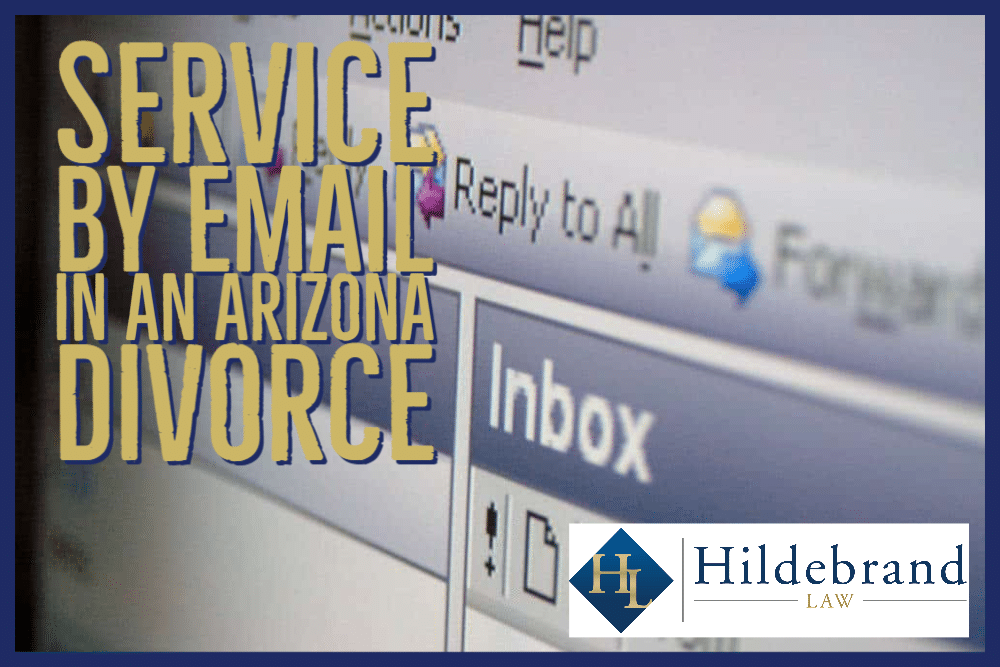Service by Email in an Arizona Divorce | Hildebrand Law, PC

The Short Answer
What happens when you cannot get divorce papers served on your spouse. The short answer is the court can issue an order allowing you to serve your spouse in any way calculated to ensure he or she is aware of the family law case.
As you will see below, a judge may give the authority to allow you to serve your spouse by, you guessed it, emailing the documents to your spouse. Read below about the Arizona Court of Appeals’ logic in the memorandum decision in the Greenham v. Hope case.
The Long Answer
Getting your spouse served with divorce papers can be difficult if that spouse’s whereabouts are unknown or they are dogging being served. The question is whether an Arizona divorce court may allow service of divorce papers by email.
The Arizona Court of Appeals in a memorandum decision in the case of Greenham vs. Hope had to address, among other things, whether a motion or petition served on the other parent by email provided the court with personal jurisdiction over a party who subsequently participated in the proceedings. The following is the Arizona Court of Appeals ruling on that issue.
Father, who had custody of the parties children, filed a petition to modify child support.

The court allowed Father to serve his petition to modify on Mother by emails sent to her email address and the email address of her new husband. The court then set an evidentiary hearing, which it later continued, over Mother’s objection, to November 5, 2012.
Mother moved for leave to appear at the hearing by telephone, acknowledging in her motion that the court would consider the parties’ child support obligations at that hearing. The record does not disclose whether the court ruled on Mother’s motion, but she failed to attend the hearing, without explanation.
After the hearing, the court adopted Father’s child support proposal, which eliminated Father’s responsibility to pay child support, required Mother to pay Father-child support of $124.43 per month beginning May 1, 2012, and required Mother to pay back child support of $204.00 per month for the months between November 2011 and April 2012.
Mother challenged the court’s entry of a child support order requiring her to pay child support after she failed to attend the scheduled child support hearing.
The court found Mother had notice and an opportunity to be heard on the matter of child support modification and accordingly adopted the child support arrangements Father had presented in 2012 when Mother failed to appear at that hearing.
On January 25, 2017, Mother moved the superior court to vacate a ruling issue on June 9, 2015, arguing the superior court lacked subject matter jurisdiction to modify child support because Father had not properly served her with his April 19, 2012 petition to modify child support.
The superior court denied the motion, and Mother timely appealed.
The Court of Appeals stated that Mother argued the superior court did not have jurisdiction to modify the child support order. Specifically, Mother claims Father failed to properly serve her with his April 19, 2012 petition to modify child support, which she contends divested the superior court of jurisdiction and rendered its subsequent ruling void.
She further argues she was deprived of due process because she was not given proper notice that the court was going to consider child support modifications at the hearing on November 5, 2012.

Mother’s argument that she was not properly served with the child support petition amounts, at most, to a challenge to personal jurisdiction, not subject-matter jurisdiction.
But Mother waived any challenge to personal jurisdiction by repeatedly appearing in court and making court filings in the child support proceeding.
Indeed, we already have held that “Mother has waived any challenge to personal jurisdiction because she appeared in the matter and litigated it on the merits.”
If you have questions about service by email in an Arizona divorce case, you should seriously consider contacting the attorneys at Hildebrand Law, PC. Our Arizona child support and family law attorneys have decades of combined experience successfully representing clients in child support and family law cases.
Our family law firm has earned numerous awards such as US News and World Reports Best Arizona Family Law Firm, US News and World Report Best Divorce Attorneys, “Best of the Valley” by Arizona Foothills readers, and “Best Arizona Divorce Law Firms” by North Scottsdale Magazine.
Call us today at (480)305-8300 or reach out to us through our appointment scheduling form to schedule your personalized consultation and turn your Arizona child support or family law case around today.
Contact Form

Other Articles About Child Support in Arizona
- ARIZONA CHILD SUPPORT LAWS
- THE DEFINITIVE GUIDE TO CHILD SUPPORT IN ARIZONA
- ARIZONA UNIFORM INTERSTATE FAMILY SUPPORT ACT (UIFSA) STATUTES
- ATTRIBUTING INCOME FOR CHILD SUPPORT IN ARIZONA
- DIVIDING UNCOVERED MEDICAL EXPENSES IN AN ARIZONA CHILD SUPPORT CASE
- THE RELATIONSHIP BETWEEN CHILD SUPPORT AND DEBTS IN ARIZONA
- DUE PROCESS REQUIRES NOTICE OF A CHILD SUPPORT MODIFICATION
- CHILD SUPPORT DEVIATION IN ARIZONA
- IS AN INCREASE IN INCOME CAUSE TO MODIFY CHILD SUPPORT IN ARIZONA
- CHILD SUPPORT AND ASSETS IN ARIZONA
- EFFECT OF EMPLOYMENT BENEFITS ON CHILD SUPPORT IN ARIZONA
- EFFECT OF STOCK OPTIONS ON CHILD SUPPORT IN ARIZONA
- MODIFYING CHILD SUPPORT FROM ANOTHER STATE IN ARIZONA
- CHILD SUPPORT MUST BE MODIFIED WHENEVER CHILD CUSTODY ORDERS CHANGE IN ARIZONA
- BURDEN OF PROOF FOR A DEVIATION IN CHILD SUPPORT IN ARIZONA
- REIMBURSEMENT FOR OVERPAID CHILD SUPPORT IN ARIZONA
- GIFTS AND FREE RENT MAY BE INCOME FOR CHILD SUPPORT PURPOSES
- COURT DISCRETION TO ADD RECURRING GIFTS AS INCOME FOR CHILD SUPPORT
- CHILD SUPPORT AND THE NARCISSIST PARENT
- INCLUDING INCOME FROM A SECOND JOB IN ARIZONA CHILD SUPPORT CALCULATIONS
- STANDARD OF PROOF TO ESTABLISH A WAIVER OF PAST CHILD SUPPORT IN ARIZONA
- CHILD SUPPORT CANNOT BE A PERCENTAGE OF A PARENT’S INCOME IN ARIZONA
- WHAT IS A WAGE ASSIGNMENT IN ARIZONA
- THE AGE WHEN CHILD SUPPORT ENDS IN ARIZONA
- SSDI PAYMENTS OFFSET MEDICAL EXPENSES FOR A CHILD IN ARIZONA
- MODIFYING CHILD SUPPORT WHEN NEITHER PARENT LIVES IN ARIZONA
- HOW TO MODIFY OR ENFORCE A CHILD SUPPORT ORDER ISSUED IN ANOTHER STATE
- HOW TO MAKE ARIZONA CHILD SUPPORT PAYMENTS
- HOW IS INCOME CALCULATED FOR CHILD SUPPORT IN ARIZONA
- HOW TO ENFORCE A CHILD SUPPORT ORDER IN ARIZONA
- WHAT IS CONSIDERED GROSS INCOME FOR ARIZONA CHILD SUPPORT
- CALCULATING A PARENT’S INCOME FOR CHILD SUPPORT IN ARIZONA
- ERRORS IN REGISTERING A CHILD SUPPORT ORDER FROM ANOTHER STATE IN ARIZONA
- DOMESTICATING A CHILD SUPPORT ORDER IN ARIZONA
- CHILD SUPPORT AND AN UNEMPLOYED PARENT IN ARIZONA
- WHAT DOCTORS SHOULD KNOW ABOUT CHILD SUPPORT IN ARIZONA
- CAN A NON-CUSTODIAL PARENT RECEIVE CHILDREN’S SOCIAL SECURITY BENEFITS IN ARIZONA
- START DATE FOR TEMPORARY SUPPORT IN ARIZONA
- EFFECT OF DENIAL OF VISITATION ON CHILD SUPPORT PAYMENTS IN ARIZONA
- ARIZONA CHILD SUPPORT FREQUENTLY ASKED QUESTIONS
- EFFECT OF ERRORS IN REGISTERING A CHILD SUPPORT ORDER FROM ANOTHER STATE IN ARIZONA
- WHEN YOU CAN MODIFY CHILD SUPPORT IN ARIZONA
- GIFT INCOME AND MODIFICATION OF CHILD SUPPORT IN ARIZONA
- WAIVER OF PAST CHILD SUPPORT BY AGREEMENT IN ARIZONA
- UPWARD DEVIATION IN CHILD SUPPORT IN ARIZONA
- MODIFYING A CHILD SUPPORT ORDER FROM ANOTHER COUNTRY
- OBJECTION TO CHILD SUPPORT ARREARS IN UIFSA DOMESTICATION IN ARIZONA
- CAN A SPOUSE’S INCOME BE CONSIDERED FOR CHILD SUPPORT IN ARIZONA
- LEGAL METHODS OF COLLECTING CHILD SUPPORT PAYMENTS IN ARIZONA
- ENFORCEMENT OF A FOREIGN COUNTRY CHILD SUPPORT ORDER IN ARIZONA
- DRIVERS LICENSE RESTRICTIONS FOR UNPAID CHILD SUPPORT IN ARIZONA
- CAN A LOAN BE INCLUDED AS INCOME FOR CHILD SUPPORT IN ARIZONA
- OVERPAYMENT OF CHILD SUPPORT IN ARIZONA
- PAST DUE SUPPORT PAYMENTS APPLY FIRST TO CHILD SUPPORT BEFORE ALIMONY
- CALCULATING CHILD SUPPORT WITH SPLIT CUSTODY OF CHILDREN IN ARIZONA
- EFFECT OF DELAY IN COLLECTING CHILD SUPPORT ARREARAGES IN ARIZONA
- RECOVERING CHILD SUPPORT NOT ORDERED IN A DIVORCE DECREE IN ARIZONA
- LEGAL OPTIONS FOR COLLECTING CHILD SUPPORT PAYMENTS IN ARIZONA
- ARIZONA COURT’S AUTHORITY TO HEAR CHILD SUPPORT ENFORCEMENT ACTIONS
- IMPACT OF WITHHOLDING A CHILD ON CHILD SUPPORT IN ARIZONA
- SISTER STATE’S RIGHT TO MODIFY ARIZONA CHILD SUPPORT RULING
- IS A CHILD SUPPORT ORDER VOID IF IT DOES NOT MENTION ARREARS IN ARIZONA
- CHILD SUPPORT OBLIGATIONS OF A MINOR IN ARIZONA
- TIME LIMIT TO COLLECT CHILD SUPPORT ARREARAGES IN ARIZONA
- RETROACTIVE MODIFICATION OF A CHILD SUPPORT ORDER IN ARIZONA
- CONTEMPT OF COURT FOR UNPAID CHILD SUPPORT ARREARAGES IN ARIZONA
- SUPPORT FOR DISABLED ADULT CHILDREN IN ARIZONA
- CALCULATING INCOME FOR CHILD SUPPORT IN ARIZONA
- DISMISSING MODIFICATION OF CHILD SUPPORT FOR NOT DISCLOSING FINANCIAL DOCUMENTS
- ARIZONA CHILD SUPPORT MODIFICATIONS MUST INCLUDE ANY CHANGES IN PARENTING TIME
- EQUITABLE DEFENSES TO FAMILY SUPPORT IN ARIZONA
- AFFIDAVIT OF CHILD SUPPORT ARREARS FROM ANOTHER STATE IN ARIZONA
- PERSONAL JURISDICTION AND CHILD SUPPORT ARREARAGES IN ARIZONA
- PERSONAL JURISDICTION OVER A NON-RESIDENT IN AN ARIZONA CHILD SUPPORT CASE
- ARIZONA CRIMINAL LAW FOR NON-PAYMENT OF CHILD SUPPORT IS CONSTITUTIONAL
- BURDEN OF PROOF IN A MODIFICATION OF CHILD SUPPORT CASE IN ARIZONA
- FULL FAITH AND CREDIT CLAUSE REQUIRES PERSONAL JURISDICTION TO ENFORCE SUPPORT ORDERS
- CHILD SUPPORT IN A BANK ACCOUNT IS EXEMPT FROM EXECUTION BY CREDITORS
- NON-PARENT LAWSUIT FOR REIMBURSEMENT OF CHILD SUPPORT IN ARIZONA

About the Author: Christopher Hildebrand is an award-winning Arizona divorce and family law attorney with decades of experience with a law practice that has received numerous awards including “US News and World Report Best Law Firms”, “Top Family Law Attorney” from North Valley magazine, “Best of the Valley Family Law Attorneys” from Arizona Foothills Magazine, “Preeminent Attorney AV Rated” attorney from Martindale-Hubbell, and many others.
